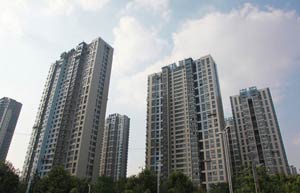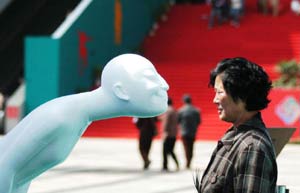Evidence is mounting that the government's almost four-year-long curbs on buyers in the urban housing market are being given a quiet burial. Inadvertently or otherwise, the timing cannot be more appropriate - when both manufacturing and retail sales are at a low ebb and investors are worried about the possibility of a further slowdown in China's economic growth.
It is reported that of the 70 large cities where the central government-prompted restrictions were imposed, 66 have more or less relaxed implementing the rules.
Local governments obviously can no longer put up with the pain from housing price declines in the last few months, which was followed by a decline in developers' interest in buying new land and starting new projects as well as a fall in revenue from land auctions.
The market now probably has much less interest in speculative purchases, or in "stir-frying housing prices", as the Chinese say.
It is because, first, the official curbs have not been lifted completely. At least, the central government hasn't made an open statement to that effect.
Second, the market will continue to be affected by the many empty houses, and even ghost towns, built during the housing boom in 2009 in the second and third-tier cities. Few of those empty houses would ever be sold at their original asking price. Their existence is a dampener for the industry.
Nonetheless, officials have indisputably softened their policy position. And the change may help at least some cities, especially those with industries or services that attract new migration - which represents genuine demand for new housing - to regain some business activity.
From a macroeconomic perspective, however, the change may be more important than what's evident in individual cities. A small rise in housing sales, even though not in all cities, may be useful to prevent the broad picture from looking even worse in the last few months of the year.
It must be pointed out that from the outset, the government's curbs have been controversial.
One part of the government policy, expanding housing supply to low-income households, is unquestionably necessary. But the second part, forbidding the sale or purchase of luxury units among the newly rich, wasn't really needed. The government has no duty to protect rich people from possible loss in their own speculative game.
Relaxing the ban on the buying and selling of luxury units may start a trickle-down process and generate sales, and more profitable land development companies. At least, it would help the rich spend more money in their homeland instead of paying for migration to other countries through real-estate purchases.
Now that the government has built a large number of small units for sale at low prices or rentals, and with their number expected to continue to rise to accommodate more low-income households, the overall supply in urban residential housing has become more balanced.
In many cities, a double-track housing market has come into being. So it would make continued curbs and transaction restrictions on luxury housing appear all the more pointless.
There is no way of telling how much business the easing of housing market rules can generate, just as there is no way of telling which government policy works better to promote economic growth.
But by its very nature, the government, working with the market, can be more efficient than acting single-handedly. There can be no mistake about it - especially now, when many of the government's policy weapons have been used, and how much economic growth China can generate in the last few months of the year remains an uncertainty.
The author is editor-at-large of China Daily.
 |
 |
|
|
|
